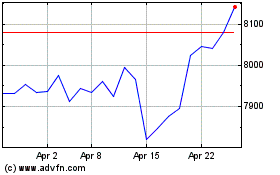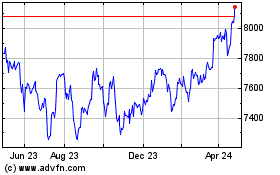By Mark DeCambre, MarketWatch
Stoxx 600 moves back into negative territory for 2018
European stocks closed sharply lower Friday as worries that
problems in Turkey could infect other eurozone countries unsettled
investors and sparked a tumble in equity indexes throughout the
globe.
What are markets doing?
The Stoxx Europe 600 finished down 1.1% to 385.86. With the
move, the pan-European gauge booked a weekly decline of 0.9%,
marking its largest weekly drop since June 29, according to Dow
Jones Market Data. The decline also pushed the index about 0.9%
lower for the year, thus far.
Germany's DAX 30 booked a 2% decline to 12,424.35, representing
its largest daily decline since June 25. The index lost 1.5% for
the week, marking its second straight such decline.
Meanwhile, France's CAC 40 shed 1.6% to 5,414.68, marking its
worst day since June 25. The French bourse recorded a weekly drop
of 1.2%, its steepest weekly drop since late June. The U.K.'s FTSE
100 , meanwhile, stumbled 1% lower to close at 7,667.01, holding on
to a slight weekly gain of 0.1%. The index has posted a weekly gain
in four of the past five weeks.
Meanwhile, the FTSE MIB Italy index declined by 2.5% to
21,090.78. For the week, the gauge lost 2.3%, while Spain's IBEX 35
retreated by 1.6% to reach 9,602.10. The IBEX notched a weekly fall
of 1.4%.
The euro edged down 0.9% to $1.1462, compared with $1.1610 late
Thursday in New York. The British pound slumped 0.7% to
$1.2736.
What's driving the market?
The tumble for European stocks comes after a report from the
Financial Times
(https://www.ft.com/content/51311230-9be7-11e8-9702-5946bae86e6d)
(paywall) said that the European Central Bank has grown
increasingly concerned about potential contagion from Turkey's
problems, especially in the banking sector. An address by Turkish
President Recep Tayyip Erdogan appeared to worsen woes for the lira
with a speech Friday.
The news sparked a risk-off atmosphere in EU markets, with
Germany, the largest member of the EU, seeing its stock benchmark
among the more severe declines, and southern European countries,
Spain and Italy, viewed as among the smaller and more vulnerable to
eurozone worries, sliding sharply as well.
The lira , which has been consistently hovering around an
all-time low against the U.S. dollar this summer, fell to a fresh
nadir
(http://www.marketwatch.com/story/dollar-index-jumps-to-around-one-year-high-as-turkeys-lira-gets-rocked-2018-08-10)
and European currencies were also dealt a blow as investors rush
into U.S. dollars.
Read:Adidas faces a tough second half amid worrisome signs in
Western Europe
(http://www.marketwatch.com/story/adidas-faces-a-tough-second-half-amid-worrisome-signs-in-western-europe-2018-08-10)
According to FactSet data, Turkey's lira is down 28% this week,
bringing its year-to-date decline to more than 35%.
The euro was down sharply against the dollar, with one buck
changing hands at $1.1422 compared with $1.1526 late Thursday in
New York, while the British pound also took a hit against
greenback. Sterling last bought $1.2736, versus $1.2824
Thursday.
What are strategists saying?
"For some time now investors have been looking at the unfolding
currency crisis in Turkey as a local difficulty, however the
accelerating speed of the declines appears to be raising concerns
about European banks exposure to the Turkish banking system," said
Michael Hewson, chief market analyst at CMC Markets UK.
There are "reports that the European Central Bank is concerned
that some banks in France, Italy and Spain may not be fully hedged
against the precipitous falls in the Turkish Lira through their
exposure to the Turkish banking system, has seen the euro fall
sharply," Hewson said. "If these Turkish banks start defaulting on
their foreign currency loans to these banks in Europe, with Spain's
banks reportedly having the largest exposure, according to the Bank
for International Settlements."
"European shares lead global stock markets increasingly lower
and Wall Street futures are far enough into the red to indicate no
comeback by U.S. indices by cash open," said Ken Odeluga, market
analyst at City Index.
"Once again, investors show they perceive a too-strong dollar to
be the key medium of harm from increasing trade restrictions and
other geopolitical tensions. Anxiety from fresh U.S. sanctions on
Russia rises as the ruble spirals lower still, whilst Turkey's lira
offers no solace after an alarming 10% downward spike to its latest
nadir," he said.
Stocks in focus
Weighing on the German index, shares of Deutsche Bank AG
(DBK.XE) (DBK.XE) tumbled over 5% after a downgrade to underweight
by analysts at Morgan Stanley.,
Shares of Spain's BBVA SA (BBVA.MC)(BBVA.MC) slumped 5.2%,
Italy's UniCredit SpA (UCG.MI) gave up 6% and France's BNP Paribas
SA (BNP.FR) shed 3%. The banks are among the biggest lenders to
Turkey and have come under closer scrutiny by the Single
Supervisory Mechanism, the ECB's arm charged with monitoring the
region's banks, according the FT report.
Novozymes A/S (NZYM-B.KO) closed down 3.3% following the release
of second-quarter results from the Danish biotech firm.
(END) Dow Jones Newswires
August 10, 2018 14:13 ET (18:13 GMT)
Copyright (c) 2018 Dow Jones & Company, Inc.
FTSE 100
Index Chart
From Mar 2024 to Apr 2024

FTSE 100
Index Chart
From Apr 2023 to Apr 2024
